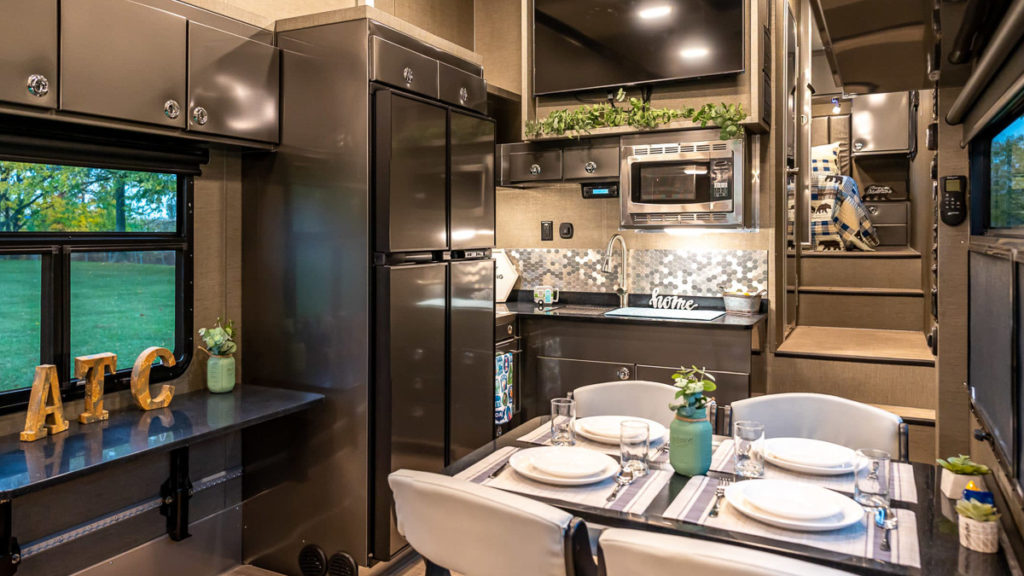Yes, boondocking with a residential refrigerator is possible. In fact, several boondockers have installed residential refrigerators into their RVs just because they want the larger storage space. However, it will require a constant source of 110-120 volt power which means either a generator, a larger solar and battery system, or both.

Boondocking with a Residential Refrigerator
Residential refrigerators are different from RV refrigerators in that they are powered exclusively via 110-120 volt electrical power, almost all of them have a water dispenser and ice maker. Most also have fans that turn on intermittently and have automatic defrost cycles. The average size residential refrigerator is 22 cubic feet.
On the other hand, most RV refrigerators have a bulky propane-based cooling system in the back. Many newer RV refrigerators are now powered exclusively via 12 volt electrical. The largest RV refrigerators are 13 cubic feet.
Residential Refrigerators Require 110-120 Volt Power Exclusively
The only way to bring power to a residential refrigerator is to plug it into a wall socket. This is a standard three-prong wall socket. Your RV comes from the factory with several of these wall sockets, however they are not normally powered from battery. They need power from a cable plugged into an RV park pedestal, or into a generator.
There are now some RV manufacturers that are powering their wall sockets from batteries. They put in several batteries to increase the available power, and even put solar panels on the roof to help out. However, these manufacturers don’t expect you to install a residential refrigerator, which typically demands more power.
How Much Power Does a Residential Refrigerator Use?
They use much more electricity than RV refrigerators because they are much larger, and they have other components like fans and automatic defrosters.
- All refrigerators cycle on/off throughout the day. A typical 22 cubic foot residential refrigerator requires about 1,200 watts to start up, and about 200 watts to keep running.
- However, once the refrigerator reaches its temperature setting, it turns off.
- How much power a residential refrigerator consumes in your RV depends on a lot of factors… 1. How big the refrigerator is, 2. How often you open and close it, 3. If the sun is hitting the side of your RV where the refrigerator is, 4. How warm is it inside your RV.
Where to Get Refrigerator Power When Boondocking?
A 22 cubic foot residential refrigerator can be powered by a 2,000 watt gasoline or propane powered generator and stay running all day. Unfortunately, it means running the generator all day.
But what about solar and batteries?
You’re going to need about four (4) 100 amp hour lithium batteries along with 600 watts of solar panels, to power a residential refrigerator throughout a 24 hour period. Much of this is to provide the power needed to kick on the refrigerator. You will also need a 3,000 watt inverter to convert the battery power into 110-120 volt power that the refrigerator needs. We assume the refrigerator will be kicking on more frequently while boondocking than compared to being inside of a house.
- A residential RV could actually get by with two (2) lithium batteries, the same 600 watts of solar panels, and a smaller 2,000 watt inverter. However, that won’t leave much power available for other appliances in your RV. Four (4) of those batteries are recommended along with the higher 3,000 watt inverter.
- 600 watts of solar is just the bare minimum. The more solar the better. Solar panels cannot recharge batteries at night, obviously. Hence, you need the sunlight to both recharge batteries, and to power your appliances at the same time.
Residential Refrigerators Require a Water Line
Almost all residential refrigerators have built-in water dispensers and ice makers. So, you will want to add a dedicated water line stemming from your RV’s water pump.
Otherwise, we highly recommend getting residential refrigerator WITHOUT a water dispenser and ice maker. This way you can buy a smaller refrigerator and still get more room. Yes, these refrigerators are still being made. You can typically buy them from Lowe’s, Home Depot, Menards, et al, they may have to special order them for you.
Tips For Running a Residential Refrigerator While Boondocking
- Try to park your RV such that the sun does not shine on the wall where the refrigerator is. This will help keep electrical usage down.
- Keep the inside air temperature of your RV cool. This will also help reduce the refrigerator’s electrical usage.
- Get a refrigerator where the freezer unit is at the bottom. These refrigerators are little more efficient than side-by-side units. This is because cold air wants to sink.
- Adjust the temperature setting such that the freezer unit is keeping its contents frozen, and no more colder. This is to minimize electrical usage.

